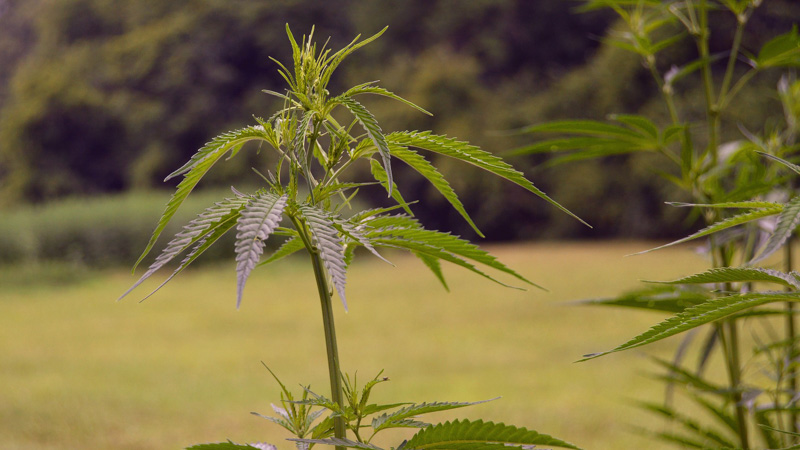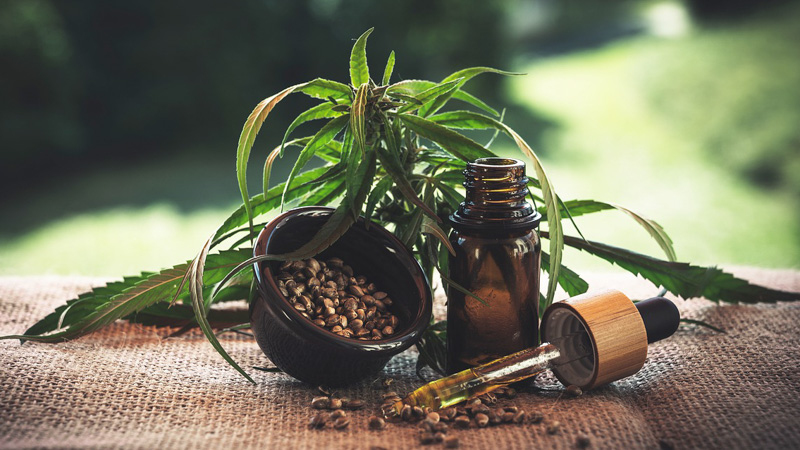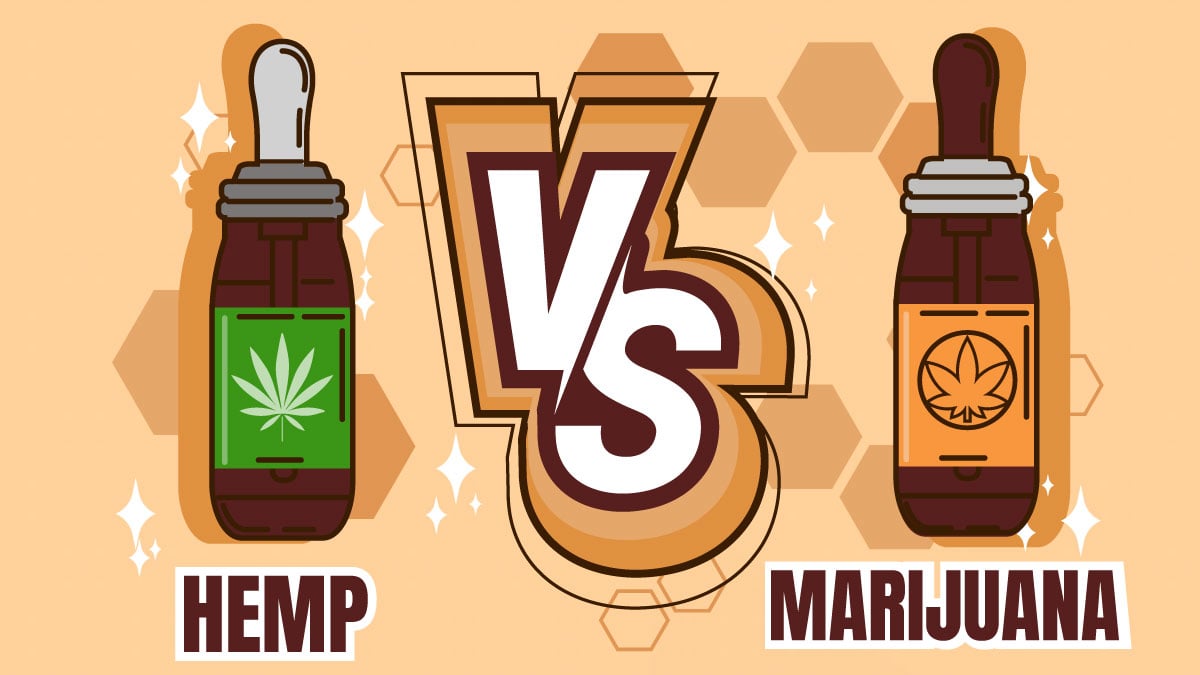There’s a lot of confusing information about CBD oil out there.
One of the most frequently asked questions from CBD users touch on the difference between CBD oil from hemp vs marijuana.
These two products are, indeed, much different, both when it comes to their chemical profile, effects, and legal status.
This article will help you understand the differences between hemp and marijuana so that you can always choose the right product for your needs without crossing the law.
Let’s break down the basic terminology first.
Explaining the Difference Between Hemp vs Marijuana

What is Cannabis?
Cannabis is a plant genus that describes an annual herbaceous plant. This plant has two primary categories: Indica and Sativa.
Marijuana and hemp belong to the Cannabis Sativa L. Family. Hemp is unique to the Cannabis sativa species, whereas marijuana can belong to either Cannabis sativa or Cannabis indica species. Since both hemp and marijuana are members of Cannabis sativa, they share similar traits.
However, hemp and marijuana are two different plants. In the next section, we focus on several noteworthy differences between these two species.
What is Hemp?
Hemp is a cannabis plant that is used commercially for its seeds, stalks, and flowers. Given its sturdy and tall nature — it can reach 4 meters in height — it’s typically grown outdoors.
The best thing about growing hemp is that you can use all parts of the plant, namely:
- Seeds are used in food and skincare products
- Stalks are harvested for their fiber and used in housing and clothing
- Flowers contain high concentrations of valuable cannabinoids and terpenes
The cannabinoid content is where you can notice the biggest difference between hemp vs marijuana. Hemp is naturally high in CBD, the non-intoxicating cannabinoid, but it comes with very little THC — below 0.3%.
Unlike marijuana, hemp is no longer mentioned in the Controlled Substances Act under the 2018 Farm Bill. The new law reclassified hemp as an agricultural commodity that can be grown and manufactured into CBD products for sale.
CBD Hemp Oil vs Hemp Seed Oil
When browsing through different CBD products, you’ll see many companies using hemp oil as a way to market their products. Be careful, as hemp oil is an umbrella term that can be used to describe two completely different products.
CBD oil refers to a product that is sourced from the plant’s flowers. These flowers are extracted for their high CBD content on top of hundreds of other supportive ingredients.
Hemp seed oil, on the other hand, is made from the seeds, as the name might lead you to expect. Hemp seeds are a well-known superfood; they contain great ratios of omega-3 and omega-6 fatty acids; they’re also a good source of protein, vitamins, and trace minerals. However, you won’t find any cannabinoids in the seeds, so if you’re looking for CBD oil, make sure the product is labeled respectively.
What is Marijuana?
Marijuana is a cannabis plant that is known for making people high. Their euphoric, relaxing, and psychoactive properties are widely used for both medical and recreational purposes. Unlike hemp, the seeds and stalks of marijuana don’t have many applications aside from their decorative aspect.
Instead, people grow marijuana for its highly resinous flowers that contain plenty of cannabinoids, especially THC. The THC content is much higher in marijuana than it is in hemp.
Some marijuana strains can reach over 30% THC per dry mass. This type of cannabis is signed under a Schedule I category of substances under the Controlled Substances Act of 1970.
The US Federal government doesn’t recognize any medical uses of marijuana and claims it carries a high risk of abuse. Despite being federally illegal in the USA, certain states have passed legislation that has legalized either medical or recreational marijuana use — according to scientific knowledge.
Considering what we’ve just said, new cannabis users may think CBD from hemp is not the same CBD as the one from marijuana. Actually, it IS the same compound.
The molecular structure of CBD is the same regardless of its source. However, the source of a CBD product will determine its chemical profile, effects, and legal status.
Differences Between CBD Oil from Hemp vs. Marijuana

When you isolate CBD from hemp and marijuana, you get the same substance and the same profile of effects. However, when you pull this compound along with other phytochemicals from your source plant, it can affect your experience with the product in a different way.
Below we shed light on the most important differences.
1. The Ratios of CBD to THC
Most CBD oils available for sale are full-spectrum extracts. This means they contain other beneficial compounds aside from CBD, including minor cannabinoids, terpenes, and traces of THC. The main difference between CBD oil from hemp and marijuana is the ratio between CBD and THC.
CBD oil sourced from hemp usually has high levels of CBD but is extremely low in THC. Legally, the THC content of hemp-derived CBD products can’t exceed 0.3%, which isn’t enough to get anybody high. While marijuana-derived CBD oil is extracted from selectively bred high-CBD hybrids, they still contain a considerable amount of THC, ranging between 5–30%.
Some high-CBD marijuana flowers can even have equal ratios of CBD and THC. This, in turn, evokes another important difference.
2. Legal Status
CBD oil is legal in the U.S. as long as it comes from hemp, both on the federal and state level. The current legal status of hemp has been clarified in the 2018 Farm Bill, which allowed American farmers to grow, manufacture, and process hemp for CBD products. You can also legally transport and travel with CBD oil.
Plus, you don’t need a prescription to buy CBD hemp oil. It’s widely available over the counter and online.
Marijuana-derived CBD oil is subject to different laws. A total of 47 states have created some sort of medical marijuana programs, while 11 states — including Washington D.C.) have legalized marijuana for recreational use. However, the federal government still considers marijuana an illicit substance, banning its cultivation, possession, sales, and transportation.
The peak of absurd?
Imagine this: you’re traveling between two marijuana-friendly states, and since you have some stash with you, you decide to take it on the plane. And then, at the airport, you experience a brutal clash with reality because you’re caught and charged with a federal offense.
BECAUSE YOU WERE TRANSPORTING A PLANT THAT IS LEGAL IN TWO NEIGHBORING STATES.
What part of the above sentence don’t you understand? </sarcasm>
3. Effects
Hemp-derived CBD oil won’t get you high due to its low THC content. Instead, you may feel a sense of balance, experience relief from physical and mental discomfort, notice positive changes in your mood, and feel more relaxed.
CBD oil from marijuana can get you high, although the intoxicating effects of such products are less potent considering that CBD counteracts THC’s psychoactive properties. On top of the signature marijuana high, users report a strong analgesic effect, deep relaxation, and alleviation of depressive thoughts.
4. Potential Applications
Full-spectrum CBD oils made from hemp are classified as health supplements, so as we said, you don’t need a prescription to buy them. In fact, CBD oil is widely available in pharmacies, vape shops, health stores, and wellness centers across the United States. The main goal of using CBD hemp oil is to bring back the chemical balance in the body through the signaling of the human endocannabinoid system (ECS) and improve the quality of life. We encourage you to do your own research on this subject, as we’re not allowed to make medical claims about CBD hemp oil as a company selling CBD extracts.
When it comes to marijuana-derived CBD oils, you can find them in medical or recreational dispensaries if they operate in your state.
Should I Buy CBD Oil From Hemp or Marijuana?
There is no one-size-fits-all answer.
As mentioned, CBD is CBD, so your body doesn’t care where it comes from. However, it does care about the other 400+ compounds that you take along with it. CBD oil is more than just about cannabidiol. There are other cannabinoids that impact its effect profile. Terpenes and other phytochemicals matter too.
Studies conducted by experts in the cannabis field concluded that all components of cannabis work synergistically to amplify each other’s effects. That’s why different cannabis strains provide different results. The effects are also more potent than those produced by each compound alone.
Medical researchers describe this phenomenon as the entourage effect.
The proportions between CBD and THC, the presence of terpenes, and the number of minor cannabinoids create a unique set of effects and determine your body’s response to cannabis. According to some studies, equal ratios of CBD to THC are the most effective but even a 20:1 ratio can produce better effects.
If you’re looking for the health benefits of THC but want to minimize the intoxicating effects of high-THC, low-CBD flowers, you may want to purchase marijuana-derived CBD oil. But once again, your state must have a legal medical or recreational marijuana market.
But, if you’re eyes are set on a federally legal product that will still contain the full spectrum cannabinoids — with negligible amounts of THC — then CBD hemp oil will be your best bet.
Summarizing Differences Between CBD Oil from Hemp vs Marijuana
We hope that this article has helped you understand the differences between CBD oil from hemp and marijuana. Despite being the members of one plant family, hemp and marijuana have different chemical profiles and potential applications. By knowing how to tell the difference between marijuana-derived and hemp-derived CBD oil, you can make a well thought out decision next time you shop for CBD oil.
Which type of CBD oil do you prefer? Are you Team Hemp or Team Marijuana? Let us know in the comment section!
